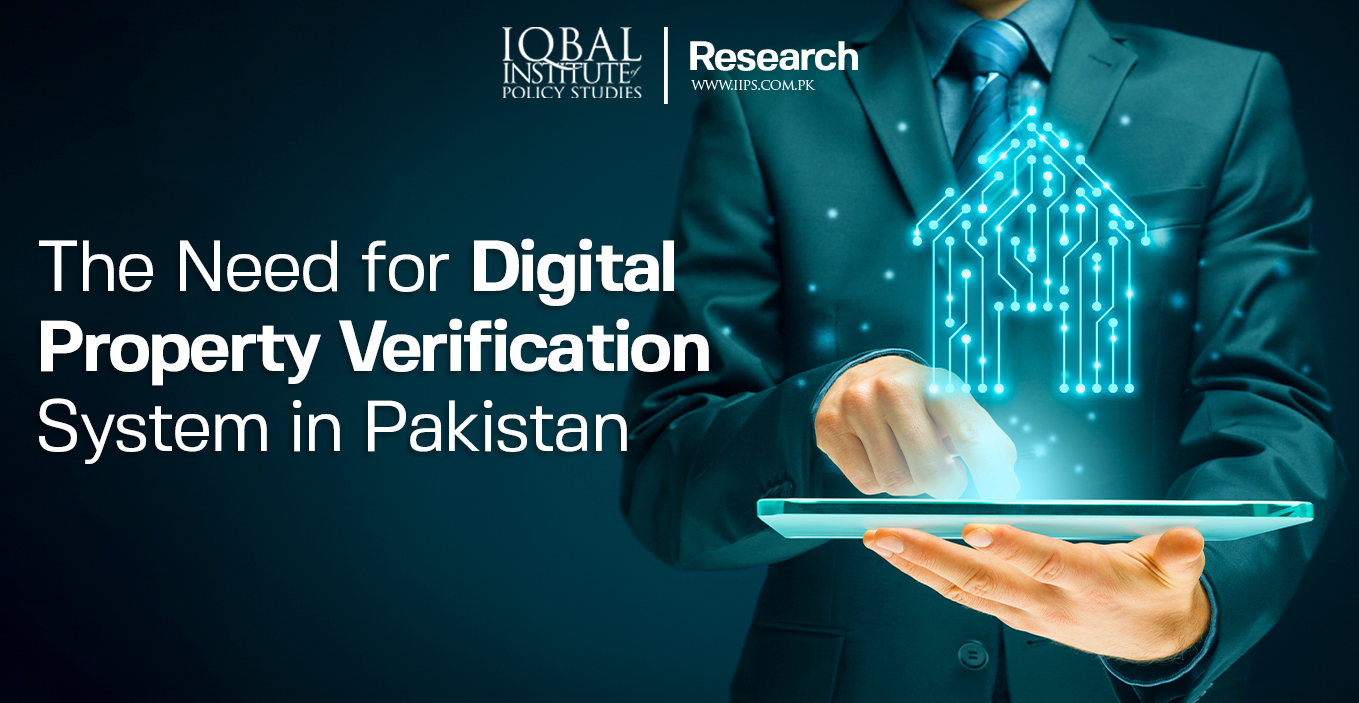The advent of digitisation has revolutionised the core values of the real estate industry through fast-paced technologies like proptech, contech and fintech. Pakistan is no exception to the rapidly digitising world. With a booming real estate industry, real estate assets amass 60 to 70 % of the country’s total wealth. The real estate sector is the second largest sector in Pakistan’s economy after agriculture, generating employment through more than 40 allied industries. Moreover, construction and asset management are important aspects of the real estate sector. With land being the most valuable commodity in an economy, transactions constitute a major chunk of the real estate sector. Due to an unregulated real estate market, the “capital trap” has become a major challenge for investors. Most of the horizontal and vertical projects launched in Pakistan remain unapproved due to lengthy approval processes and illegal possession of lands. According to the figures projected by CDA, Islamabad has approximately 64 authorised housing societies and around 140 illegal housing societies. A lack of a Digital Property Verification System has made the investors vulnerable to the pervasive malpractices in the real estate sector.
This article by the Iqbal Institute of Policy Studies will discuss the imminent need for a Digital Property Verification System in Pakistan. The article explains the difficulties of manual Property Verification, transparency in real estate transactions and the increased access to information due to the digital system.
Difficulties of Manual Property Verification
The inspection and verification of property is the foremost step of each real estate transaction. Manual property inspection becomes highly impractical with the busy schedules and everyday commitments. The investors skip this step to save time and rely solely on the information provided by their respective ‘property dealers’. The Property Dealers, in turn, exploit the investors’ obliviousness and speed up the transaction without confirming the legal status of the land or project. This practice has resulted in the increasing fraction of investments stuck in the ‘capital trap’. Therefore, Property Verification is essential to avoid fraudulent transactions. The Manual Property Verification conducts due diligence of mandatory documents to ensure safe and secure transactions. Investors should keep a checklist of mandatory documents such as Title Deed (confirms the title of the property), Approved Plan of Property (especially relevant with Housing Societies), Property Tax Receipts, NOCs, Sale Agreement, Sale Deed (required during transfer of property), Special Power of Attorney etc.
The vast list of documents required to affirm the integrity of the land or real estate project makes the procedure time-consuming. Moreover, you have to be physically present in a particular geographical region to obtain the documents for due diligence. This increases the additional costs of obtaining documents for the particular investment opportunity. Furthermore, in the case of Overseas Pakistanis, the Special Power of Attorney is required to complete the Transfer of Property in Islamabad, which delays the process. Because the availability of Special Power of Attorney depends on the laws of the country of residence. The investors fall for quick and easy ways to inject their capital into the real estate economy resulting in capital traps. Therefore, a Digital Property Verification System is paramount to ensure safe and secure transactions.
Eradication of Malpractices
Digitisation trends have revolutionised the core values of the real estate industry through fast-paced technologies like proptech, contech and fintech. A Digital Property Verification System will ensure quick access to information for the investors and reduce additional investment costs. A Digital Database will eliminate the third parties, i.e., brokers, from the real estate transactions and reduce the incidents of malpractices or fraudulent transactions. Furthermore, the Government of Pakistan has made it mandatory for Real Estate Agents to register with the FBR by January 2022. As a result, the regulated Real Estate Professionals will be allowed to work in the market under a set of rules and standards devised by the Government. The implementation of RERA will further minimise the risks of fraudulent transactions and ensure the penalisation of those involved in malpractices. A Digital Property Verification System will also remove the practice of bribery, prevalent to forge the land documents for financial crimes and botch transactions.
Pakistan reached its highest ever recorded urbanisation, 37.17%, in 2020, urbanising at the rate of 3%, which is the fastest in South Asia. These demographic realities reflect the real estate sector’s potential in improving Pakistan’s economy. However, the lack of a digitised and consolidated database has contributed to numerous problems in terms of capital influx into the economy. Due to an unregulated real estate market and inexperienced investors, the “capital trap” has become a major issue in real estate transactions. The awareness of property rights is crucial for realising the potential of the real estate sector in the economy’s growth. Digitisation provides quick access to information and educates inexperienced investors. Thus, eradicating unethical corporate practices is essential to restore investors’ confidence in the real estate market and ensure the efficacy of real estate transactions.
The Role of Private Entities in Digitisation
The Government is taking adequate measures for regularisation in line with the Prime Minister’s vision of Digital Pakistan. Due to a lack of resources, the role of private entities is crucial to ensure the implementation of a digital framework. Realising the potential of the real estate sector, the IMARAT Group has recently launched Propsure Digital Solutions, offering Pakistan’s first-ever online property verification and inspection services. Propsure is a proptech company that uses disruptive technologies to conduct spatial analysis to create a digital map of a particular property. They aid investors in making informed decisions through their in-depth real estate market analysis. The market analysis includes information about the property’s price, dimensions, permitted land usage, by-laws, plot status, building height, adjoining road, and multiple other metrics.
Propsure has accomplished geo-tagging and digital mapping of over 3 Million Plots, 0.5 Million Points of Interest and 0.2 Million Roads in planned areas of 7 major cities of Pakistan. Each of these plots has exclusive data with 47 different indicators to aid investors in making informed real estate investment decisions. They have also launched the Property Inspection Services (“PINS”) to provide ‘approval’ and ‘land-usage-status’ of a given property to investors with an insight into applicable bylaws and regulations. Each property in Propsure’s inventory contains a Title Plan and a Title Register by the legal and regulatory status of the relevant plot. In essence, through digitising land records, Propsure has amplified market knowledge with the true impact of location-based data to understand better the real estate market and the factors that drive growth. The Government of Pakistan is making consistent efforts to digitise the land records to increase the capital influx in the real estate economy. The innovative s of private companies (like Propsure) is a remarkable development in the vision of Digital Pakistan.
Conclusion
Pakistan needs Digital Property Verification to ensure transparency, promote ethical corporate practices, create awareness and eradicate malpractices in the real estate sector. The process of manually obtaining documents for property verification is time-consuming. This results in investors opting for quick and easy ways to speed up real estate transactions. Lack of awareness of inexperienced investors leads them into the ‘capital trap’ and hampers the capital influx into the economy. The digitisation of the real estate sector has introduced new technologies to resolve these problems. A Digital Property Verification System will ensure that investors know the due diligence requirements of real estate transactions. It will eliminate the influence of Brokers and Property Dealers involved in bribery and sham transactions. The complete eradication of corruption and malpractices in the real estate sector requires collective efforts from the Government, private entities and society. The Government is regularising the real estate economy of Pakistan to prevent financial crimes and to guarantee the progress of the real estate industry. However, Pakistan is a developing country with limited resources to invest in new research and digitisation. The role of private companies is important to facilitate the Government in attaining the vision of Digital Pakistan. The continuous efforts of IMARAT Group and Propsure to ensure transparency through digitisation are commendable.
Bibliography
Capital Development Authority. (2021, May 05). CDA. Retrieved from https://www.cda.gov.pk/housing/unauthorised_schemes.asp
Pakistan – urbanisation 2020 | Statista. (2021). Retrieved from https://www.statista.com/statistics/455907/urbanization-in-pakistan/
Rana, S. New curbs on real estate dealings | The Express Tribune. (2021). Retrieved 3 December 2021, from https://tribune.com.pk/story/2331673/new-curbs-on-real-estate-dealings
R. (2021, January 29). Your Guide to Verification of Property Documents. JagahOnline. Retrieved from https://www.jagahonline.com/blog/how-can-i-verify-property-registry-legal-documents-before-making-the-offer-or-buying-the-property/
Why Real Estate Digitalization is the Way to Go?. (2020). Retrieved 19 November 2021, from https://www.europeanproperty.com/news/why-real-estate-digitalization-is-the-way-to-go/#:~:text=Real%20estate%20digitalization%20helps%20to,your%20customers%20feel%20more%20appreciated.
World Population Clock: 7.9 Billion People (2021) – Worldometer. (2021). Retrieved from https://www.worldometers.info/world-population/ the real estate markets

Research Questions
What difficulties are faced by investors with Manual Property Verification System?
What are the benefits of the Digital Property Verification System?
How will a developing country, like Pakistan, implement the Digital Property Verification System with limited resources?[/fancy_box][fancy_box box_style=”color_box_basic” icon_family=”fontawesome” image_url=”8182″ box_color_opacity=”1″ box_alignment=”left” border_radius=”default” image_loading=”default” icon_fontawesome=”fa fa-envelope-open” icon_size=”60″]
Key Takeaways
The busy schedules and everyday commitments have made manual property verification and inspection highly impractical.
Digital Property Verification System will ensure transparency, promote ethical corporate practices, create awareness and eradicate malpractices in the real estate sector.
Due to a lack of resources, the role of private entities is crucial for the implementation of a digital framework.
Propsure has accomplished geo-tagging and digital mapping of over 3 Million Plots, 0.5 Million Points of Interest and 0.2 Million Roads in planned areas of 7 major cities of Pakistan.[/fancy_box]


Leave a Reply